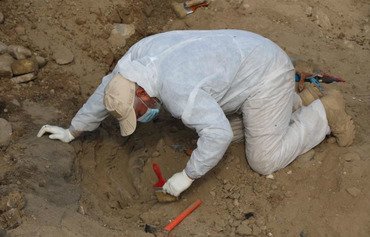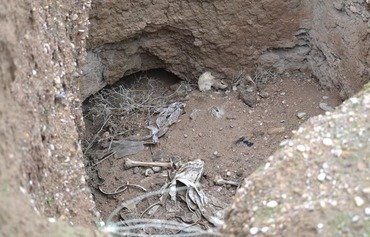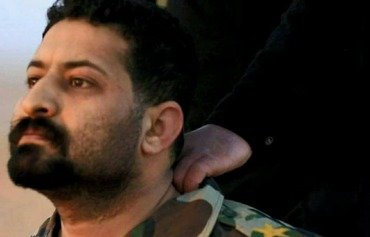The "Islamic State of Iraq and Syria" (ISIS) has been defeated in Iraq, but its legacy of violence remains, as evidenced by the large numbers of displaced persons, damaged infrastructure and mass graves -- 120 in total.
Iraq's Independent High Commission for Human Rights has identified 120 mass graves since the start of the liberation operations in early 2015, commission spokesman Ali al-Bayati told Diyaruna on Wednesday (February 7th).
Most of these sites are in Ninawa province, he said.
The graves contain the remains of civilians and military personnel, killed by ISIS fighters during execution campaigns the group carried out while it was in control of swathes of north and west Iraq, he said.
"Seventy mass graves have been found in Ninawa, al-Bayati said, most of which are located in the cities of Tal Afar and Sinjar, in the west of the province.
The search for mass graves continues, he said, with other sites discovered from time to time.
The total number of victims is not yet known, as many grave sites have not yet been opened and exhumed, al-Bayati said.
But they undoubtedly number in the thousands.
"The remains of 1,800 victims from Camp Speicher air base (Tikrit Air Academy) have been exhumed, as were the remains of 600 bodies from a grave in the Badush area (north of Mosul)," he said. "But there are many victims waiting to be taken out of graves and sites that are still closed."
Many graves await exhumation
In al-Khasfa, a mass grave near Hammam al-Alil district south of Mosul, residents say ISIS elements dumped the bodies of thousands of execution victims at the site in batches, al-Bayati said.
The site, which is considered to be one of the worst mass graves, is a large, naturally-occurring pit, he said.
Many graves have not yet been opened or exhumed due to "a lack of available resources", he said, as this task "requires material resources and a large number of specialised technical teams that have the experience and skill".
He urged concerned government agencies to do all they can to "expedite the process of extracting and identifying victims to end their families’ suffering".
He called for special courts to be established to address this issue, and for new national legislation to be enacted to declare such crimes as genocide and crimes against humanity.
These actions will help bring the perpetrators to justice and give victims' families their deserved rights, he said.

![A team from the Iraqi Health Ministry opens a mass grave near Tikrit that contains the remains of 'Islamic State of Iraq and Syria' victims in this file photo, posted online on April 15th, 2015. [Photo courtesy of the Iraqi Health Ministry]](/cnmi_di/images/2018/02/07/11395-Tikrit-mass-grave-600_384.jpg)






